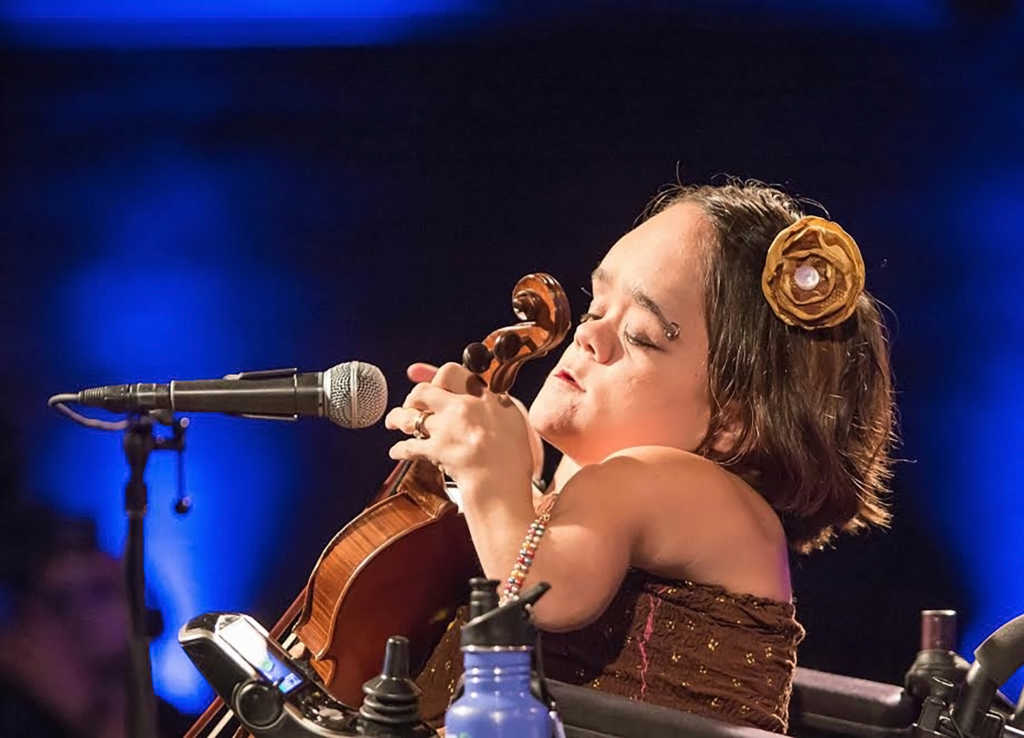Gaelynn Lea was born with brittle bones disease, but that hasn’t stopped her from pursuing her love of music. Because she had broken 50 bones in her body before she was born, and they healed in odd ways, she had to find unconventional ways to play that music she loved.
The award-winning violinist has been interested in music since the fourth grade, when she first wanted to play the cello. Because the instrument was too big for her, she and a teacher came up with a way for her to play the violin, but with special techniques for holding the instrument and using the bow, LifeSiteNews explained.
“It kind of sounds like an orchestra,” Lea said about the unique sound her playing produces. Indeed, her playing does sound like a multi-instrument orchestra, as she is able to “loop” each line of a piece to gain such an effect. Lea likes classic, Celtic, and traditional folk music.
Her determination has not merely led to successfully playing the violin as a hobby. In 2016, Lee won the Tiny Desk Contest from National Public Radio. NPR describes Tiny Desk as “intimate video performances, recorded live at the desk of all songs considered host Bob Boilen.”
Lea has since become not only a performer who has continued to build up her discography, but a speaker. She speaks not only on music, but on disabilities, inner freedom, and sexuality, as summarized in one blog post.
Lea is not shy about her disability. “I don’t think I really thought about my disability in a negative way, really,” she said, also noting that “as a kid, it was just like an exciting challenge.” Part of that freedom involves accepting limitations, whether one has a disability or not. She says she’s been asked about overcoming her disability. “I’m never going to ‘overcome’ my disability because my disability is part of who I am,” Lea said.
She also credits her disability to where she has gotten today, noting “if I didn’t have a disability, I know for sure that I wouldn’t be talking to you right now.”
Lea doesn’t want to be pitied, and she doesn’t even want to be called “inspirational,” as she feels “that’s coming from a place of pity.”
Her words extent not only for how to treat those with disabilities in our lives, but those not yet born. “You can’t ‘eradicate’ disabilities,” Lea explained. “The idea of genetic testing and [aborting] babies out preterm, it’s sort of saying, You obviously don’t, on some level, think of my life as valuable.”
Unfortunately, Lea is not speaking out of sentiment for a hypothetical situation. Iceland has succeeded in aborting nearly all diagnosed with Down Syndrome in utero, and has practically bragged about “eradicating” the disorder.
READ: Sick: Iceland Boasts About ‘Eradicating’ Those With Down Syndrome
Those who advocate for aborting those diagnosed with Down Syndrome indeed do communicate that sense that those with disabilities don’t matter or aren’t valuable, at least not as much as others. Included in CBS’ reporting is a frighteningly telling statement from Helga Sol Olafsdottir:
We don’t look at abortion as a murder. We look at it as a thing that we ended. We ended a possible life that may have had a huge complication… preventing suffering for the child and for the family. And I think that is more right than seeing it as a murder — that’s so black and white. Life isn’t black and white. Life is grey.
This is the woman who’s responsible for counseling women who receive such a diagnosis. No wonder the abortion rates are nearly 100 percent when it comes to such a diagnosis.
Whether one has Down Syndrome or brittle bones disease, there are those like Lea challenging such notions about the disabled. Natalie Dedreux, who is 18 and has Down Syndrome, manage to stun German Chancellor Angela Merkel by questioning her about the potential and the rights for those with Down Syndrome to live, rather than be aborted, as most are in Germany as well.
READ: WATCH: Teen with Down Syndrome Challenges, Stuns German Chancellor Angela Merkel on Abortion
Regardless of what one’s body is like, Lea says that “the way your body is, is the way you experience the world and it makes a lot of decisions for you. Your life unfolds in a very particular way because of the body you were born in.”


